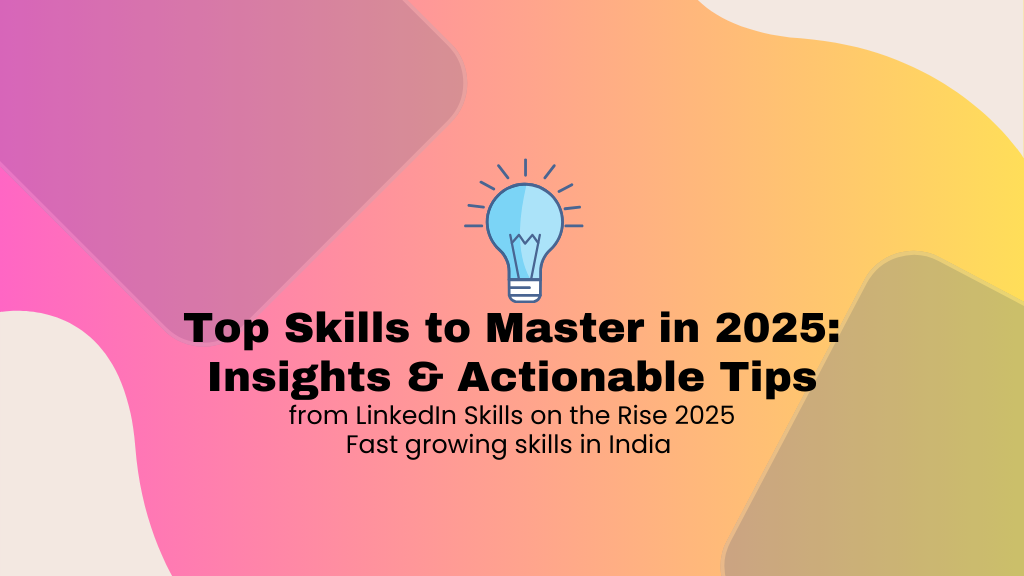Mastering a new skill has never been easier in 2025. With advancements in technology, the availability of online resources, and scientifically-backed learning methods, anyone can acquire new abilities, whether for personal growth, professional development, or leisure. However, the process of mastering any skill requires dedication, smart strategies, and the right tools. In this guide, we will break down the most effective techniques for mastering a skill in 2025, helping you become an expert faster and more efficiently.
1. Set Clear and Achievable Goals
The foundation of mastering any skill begins with setting clear, achievable goals. In 2025, the importance of goal-setting is well-understood, and using tools to structure your goals is key to maintaining focus and progress.
Key Strategies:
-
Break Down Big Goals into Smaller Tasks: Large goals can seem overwhelming, so breaking them into manageable chunks keeps you motivated and on track.
-
Use SMART Goals: The SMART framework (Specific, Measurable, Achievable, Relevant, Time-bound) ensures that your goals are clear and actionable.
-
Set Short-Term Milestones: Alongside long-term goals, short-term milestones help track incremental progress, making it easier to stay engaged.
Why It’s Important:
-
Motivation and Clarity: Clear goals help keep your focus sharp and provide motivation, knowing exactly what you need to achieve at each stage.
-
Measure Progress: Breaking goals down into measurable components lets you track improvements, which keeps you motivated and helps refine your approach.
2. Leverage Technology and Online Learning
In 2025, online learning platforms and digital tools are the most powerful resources for mastering a skill. Whether you’re learning a language, coding, or a musical instrument, technology provides instant access to expert knowledge.
Top Tools to Use:
-
Coursera and Udemy: Platforms offering in-depth courses from universities and industry professionals, covering various skills from creative arts to tech.
-
Skillshare: A platform focused on creative and practical skills, where you can learn by watching real-world tutorials and engaging with other students.
-
Duolingo and Babbel: If you’re learning a language, these apps use interactive methods and gamified experiences to boost learning and retention.
Why It’s Important:
-
Access to Experts: Technology allows you to learn from the best in the field, regardless of your location, opening up opportunities for expert-level guidance.
-
Structured Learning: Online courses are designed to guide you through structured lessons, making the learning process more efficient.
3. Practice Deliberately: Quality Over Quantity
Simply practicing for hours isn’t enough. In 2025, the emphasis is on deliberate practice—focused, intentional practice that pushes you out of your comfort zone and targets specific areas for improvement.
Key Elements of Deliberate Practice:
-
Focus on Weaknesses: Instead of repeating what you’re already good at, deliberately work on the aspects of your skill where you are weakest.
-
Break Tasks into Smaller Segments: Tackle the skill in smaller, more manageable parts, and focus on perfecting each one.
-
Get Immediate Feedback: Whether it’s through mentors, self-reflection, or automated tools, feedback is critical to knowing whether you’re improving.
Why It’s Important:
-
Faster Progress: Targeted, intentional practice allows for faster improvement and better retention of the skill.
-
Builds Mastery: Focusing on weaknesses, rather than just reinforcing strengths, leads to a more balanced mastery of the skill.
4. Consistency Is Key
Consistency remains one of the most important factors in mastering a skill. In 2025, maintaining a regular practice schedule is more achievable than ever, thanks to apps that help track progress and build habits.
Tips for Consistent Practice:
-
Create a Routine: Dedicate a specific time each day for practicing. Consistency over time leads to better results than sporadic, intense bursts.
-
Track Your Progress: Use apps like Trello, Notion, or Habitica to track your daily progress and maintain motivation.
-
Start Small: Begin with short, manageable practice sessions, and gradually increase the duration as you build endurance.
Why It’s Important:
-
Builds Habits: Consistency helps form long-lasting habits, making the practice feel like a natural part of your routine.
-
Sustained Improvement: Regular practice ensures you don’t forget or regress in your learning, enabling continuous improvement over time.
5. Use the Power of Visualization
Visualization is a powerful tool used by top performers in all fields. It involves mentally practicing the skill and imagining yourself achieving mastery, which can positively impact your real-life performance.
How to Use Visualization:
-
Imagine Success: Picture yourself performing the skill at a high level, paying attention to the details and emotions of that successful performance.
-
Use Mental Rehearsals: Regularly visualize the actions involved in mastering your skill, such as playing a musical instrument or presenting a project at work.
-
Combine with Physical Practice: Visualizing while performing the skill reinforces neural connections and accelerates learning.
Why It’s Important:
-
Mental Strength: Visualization prepares your mind for real-life performance, increasing confidence and reducing anxiety.
-
Improved Performance: Studies show that mental rehearsal can improve muscle memory and boost the quality of physical practice.
6. Get Feedback and Learn from Others
Feedback accelerates learning, and in 2025, getting constructive criticism is easier than ever with technology. Whether it’s through online communities or AI-powered tools, feedback is crucial for growth.
Where to Get Feedback:
-
Mentorship: Seek out mentors or experts in your field who can provide valuable insights and suggestions for improvement.
-
Online Communities: Platforms like Reddit, Discord, and specialized forums offer communities where you can share your progress and get feedback.
-
AI Tools: Some apps, like MasterClass, provide AI-driven feedback, helping users refine their skills more effectively.
Why It’s Important:
-
Faster Learning: Feedback helps identify mistakes and areas for improvement, which helps you focus on what really matters.
-
Objective Insights: Gaining feedback from others allows you to see blind spots and correct them quickly, improving your performance.
7. Stay Motivated and Overcome Plateaus
Learning a new skill can be challenging, especially when you hit a plateau. In 2025, motivation and resilience are just as important as technique. Finding ways to stay motivated is key to overcoming obstacles and reaching mastery.
How to Stay Motivated:
-
Set Mini-Goals: Small wins along the way help keep you motivated. Celebrate your progress and reward yourself when you reach milestones.
-
Find a Support System: Engage with others who are learning the same skill. Having a community can keep you accountable and motivated.
-
Focus on Progress, Not Perfection: Embrace the journey and recognize incremental improvements rather than aiming for immediate perfection.
Why It’s Important:
-
Sustained Commitment: Staying motivated helps you push through the difficult stages of learning and maintain focus when progress slows.
-
Resilience: Overcoming plateaus and setbacks builds mental resilience, helping you stay committed to mastering your skill.
8. Use the 80/20 Rule (Pareto Principle)
The 80/20 Rule, or Pareto Principle, suggests that 80% of results come from 20% of efforts. Applying this rule to skill acquisition allows you to focus on the most impactful areas of your learning process.
How to Apply It:
-
Identify Key Areas: Focus on the 20% of the skill that will give you the greatest return. For example, learning the fundamentals of a musical instrument or focusing on core skills in a new language.
-
Maximize Impact: Prioritize the techniques and exercises that will produce the most noticeable improvement in your performance.
Why It’s Important:
-
Efficiency: Applying the 80/20 Rule allows you to learn smarter, not harder, by prioritizing the most effective methods and avoiding unnecessary repetition.
-
Faster Mastery: This approach accelerates your learning by focusing on the skills that matter most for your goals.
Conclusion: Master Any Skill with the Right Approach
Mastering any skill in 2025 is entirely possible if you adopt the right strategies. By setting clear goals, using modern tools and resources, practicing deliberately, and staying consistent, you can accelerate your learning and achieve mastery faster. Remember, the key to success is not just hard work but working smart. Whether you’re learning a new language, perfecting a musical instrument, or acquiring a new professional skill, following these proven strategies will help you master any skill in 2025 and beyond.


